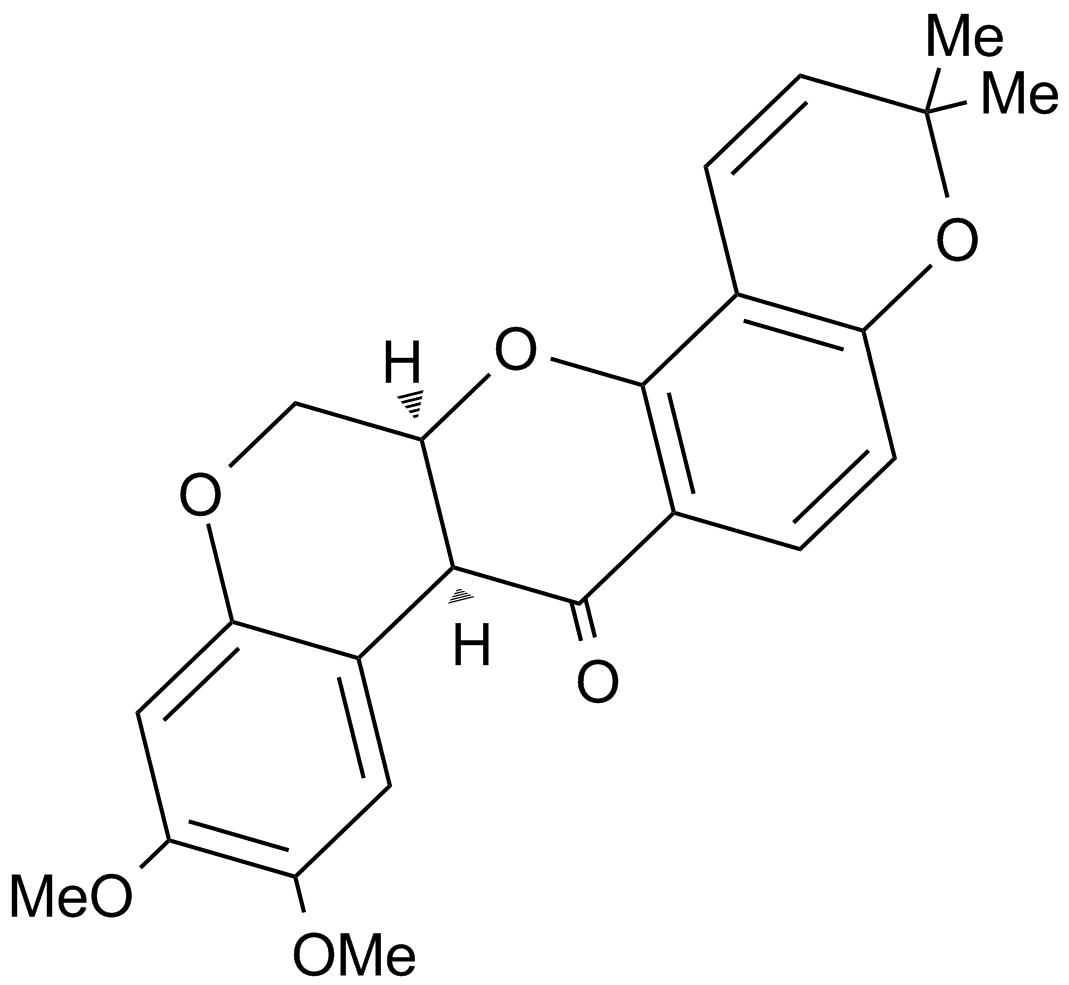Deguelin (Synonyms: (-)cisDeguelin) |
| Catalog No.GC15484 |
A potent antiproliferative rotenoid compound
Products are for research use only. Not for human use. We do not sell to patients.

Cas No.: 522-17-8
Sample solution is provided at 25 µL, 10mM.
Deguelin, a naturally occurring rotenoid, is a potent PI3K/AKT inhibitor.
Deguelin (0-500 nM) in a dose and time dependent manner inhibits the growth of MDA-MB-231, MDA-MB-468, BT-549 and BT-20 cells. Deguelin at all concentrations fails to reduce cell numbers in the presence of 1 ng EGF but in the presence of EGF 20 ng reinstated deguelin mediated growth inhibition. Deguelin treated cells show reduced expression of Survivin as determined by western blot and immunofluorescence examinations. Deguelin inhibits p-ERK and its downstream target p-STAT-3 and c-Myc expression in a dose dependent manner[1]. Deguelin down-regulates Akt signaling probably by disrupting its association with Hsp 90 in cultured HNSCC cells. Deguelin deguelin disrupts the association between Hsp 90 with survivin and Cdk4. Deguelin deguelin treatment increases cellular ceramide level through de novo synthase pathway to mediate HNSCC cell death and apoptosis[2]. Deguelin inhibits the proliferation of MPC-11 cells in a concentration- and time-dependent manner and causes the apoptotic death of MPC-11 cells. Following exposure to deguelin, the phosphorylation of Akt is decreased. Deguelin-induced apoptosis is characterized by the upregulation of Bax, downregulation of Bcl-2 and activation of caspase-3[3].
Deguelin (2 or 4 mg/kg, i.p.) reduces the in vivo tumor growth of MDA-MB-231 cells transplanted subcutaneously in athymic mice[1]. Deguelin (4 mg/kg, p.o.) treatment shows a great inhibition in tumor growth, which is demonstrated by reduced tumor size and improved mice survival and, indicating a significant anti-tumor ability by deguelin in vivo[2]. In the colon cancer xenograft model, the volume of the tumor treated with deguelin is significantly lower than that of the control, and the apoptotic index for deguelin-treated mice is much higher[4].
References:
[1]. Mehta R, et al. Deguelin action involves c-Met and EGFR signaling pathways in triple negative breast cancer cells. PLoS One. 2013 Jun 10;8(6):e65113.
[2]. Yang YL, et al. Deguelin induces both apoptosis and autophagy in cultured head and neck squamous cell carcinoma cells. PLoS One. 2013;8(1):e54736.
[3]. Li Z, et al. Deguelin, a natural rotenoid, inhibits mouse myeloma cell growth in vitro via induction of apoptosis. Oncol Lett. 2012 Oct;4(4):677-681.
[4]. Kang HW, et al. Deguelin, an Akt inhibitor, down-regulates NF-κB signaling and induces apoptosis in colon cancer cells and inhibits tumor growth in mice. Dig Dis Sci. 2012 Nov;57(11):2873-82.
Average Rating: 5 (Based on Reviews and 30 reference(s) in Google Scholar.)
GLPBIO products are for RESEARCH USE ONLY. Please make sure your review or question is research based.
Required fields are marked with *




















